The following is a list of bands and artists that were involved with the British Invasion music phenomenon that occurred between 1964 and 1966 in the United States. (Artists shown in boldface are Rock and Roll Hall of Fame inductees.)
Rock and roll is a genre of popular music that evolved in the United States during the late 1940s and early 1950s. It originated from African American music such as jazz, rhythm and blues, boogie-woogie, electric blues, gospel, and jump blues, as well as country music. While rock and roll's formative elements can be heard in blues records from the 1920s and in country records of the 1930s, the genre did not acquire its name until 1954.
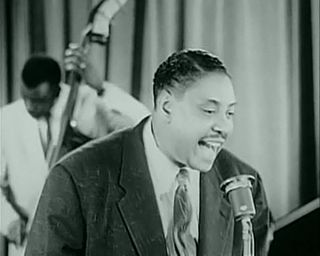
Rhythm and blues, frequently abbreviated as R&B or R'n'B, is a genre of popular music that originated within the African-American community in the 1940s. The term was originally used by record companies to describe recordings marketed predominantly to African Americans, at a time when "rocking, jazz based music ... [with a] heavy, insistent beat" was starting to become more popular. In the commercial rhythm and blues music typical of the 1950s through the 1970s, the bands usually consisted of a piano, one or two guitars, bass, drums, one or more saxophones, and sometimes background vocalists. R&B lyrical themes often encapsulate the African-American history and experience of pain and the quest for freedom and joy, as well as triumphs and failures in terms of societal racism, oppression, relationships, economics, and aspirations.

The British Invasion was a cultural phenomenon of the mid-1960s, when rock and pop music acts from the United Kingdom and other aspects of British culture became popular in the United States with significant influence on the rising "counterculture" on both sides of the Atlantic Ocean. British pop and rock groups such as the Beatles, the Rolling Stones, Gerry and the Pacemakers, the Searchers, Billy J. Kramer and the Dakotas, Freddie and the Dreamers, the Merseybeats, the Dave Clark Five, the Hollies, Manfred Mann, Herman's Hermits, Peter and Gordon, the Animals, the Zombies, the Yardbirds, the Moody Blues, the Kinks, the Spencer Davis Group, Them, the Pretty Things, the Who, Small Faces, and the Bee Gees, as well as solo singers such as Dusty Springfield, Cilla Black, Petula Clark, Marianne Faithfull, Tom Jones, and Donovan were at the forefront of the "invasion."
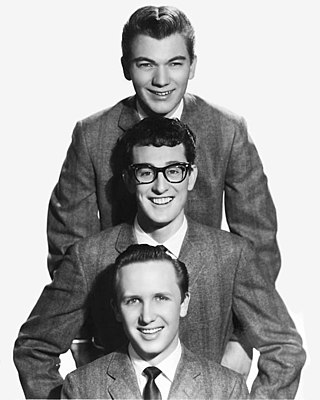
The Crickets were an American rock and roll band from Lubbock, Texas, formed by singer-songwriter Buddy Holly in January 1957. Their first hit record, "That'll Be the Day", released in May 1957, peaked at number three on the Billboard Top 100 chart on September 16, 1957. The sleeve of their first album, The "Chirping" Crickets, shows the band line-up at the time: Holly on lead vocals and lead guitar, Niki Sullivan on rhythm guitar, Jerry Allison on drums, and Joe B. Mauldin on bass. The Crickets helped set the template for subsequent rock bands, such as the Beatles, with their guitar-bass-drums line-up, performing their own material. After Holly's death in 1959, the band continued to tour and record into the 1960s and beyond with other band members through to the 21st century.

The Dave Clark Five, also known as the DC5, were an English rock and roll band formed in 1958 in Tottenham, London. Drummer Dave Clark was the group's leader, producer and co-songwriter. In January 1964, they had their first UK top-ten single, "Glad All Over", which knocked the Beatles' "I Want to Hold Your Hand" off the top of the UK Singles Chart. It peaked at No. 6 in the United States in April 1964. Although this was their only UK No. 1, they topped the US chart in December 1965, with their cover of Bobby Day's "Over and Over". Their other UK top-ten hits include "Bits and Pieces", "Can't You See That She's Mine", "Catch Us If You Can", "Everybody Knows", "The Red Balloon", "Good Old Rock 'n' Roll", and a version of Chet Powers' "Get Together".
British blues is a form of music derived from American blues that originated in the late 1950s, and reached its height of mainstream popularity in the 1960s. In Britain, blues developed a distinctive and influential style dominated by electric guitar, and made international stars of several proponents of the genre, including the Rolling Stones, the Animals, the Yardbirds, John Mayall, Eric Clapton, Fleetwood Mac and Led Zeppelin.
Beat music, British beat, or Merseybeat is a British popular music genre and developed around Liverpool in the late 1950s and early 1960s. The genre melded influences from British and American rock and roll, rhythm and blues, skiffle, traditional pop and music hall. It rose to mainstream popularity in the UK and Europe by 1963 before spreading to North America in 1964 with the British Invasion. The beat style had a significant impact on popular music and youth culture from 1960s movements such as garage rock, folk rock and psychedelic music.
Blues rock is a fusion genre and form of rock music that relies on the chords/scales and instrumental improvisation of blues. It is mostly an electric ensemble-style music with instrumentation similar to electric blues and rock. From its beginnings in the early to mid-1960s, blues rock has gone through several stylistic shifts and along the way it inspired and influenced hard rock, Southern rock, and early heavy metal.

American rock has its roots from 1940s and 1950s rock and roll, rhythm and blues, and country music, and also draws from folk music, jazz, blues, and classical music. American rock music was further influenced by the British Invasion of the American pop charts from 1964 and resulted in the development of psychedelic rock.
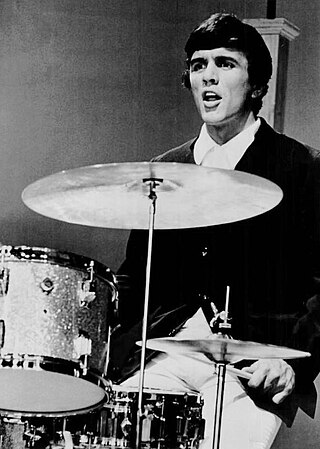
David Clark is an English musician, songwriter, record producer and entrepreneur. Clark was the leader, drummer and manager of the 1960s beat group the Dave Clark Five, the first British Invasion band to follow the Beatles to the United States in 1964. In 2008, Clark and his band were inducted into the Rock and Roll Hall of Fame.

Freddie and the Dreamers were an English beat band that had a number of hit records between 1962 and 1965. The band's stage act was enlivened by the comic antics of Freddie Garrity, who would bounce around the stage with arms and legs flying.

Freddie King was an American blues guitarist, singer and songwriter. He is considered one of the "Three Kings of the Blues Guitar". Mostly known for his soulful and powerful voice and distinctive guitar playing, King had a major influence on electric blues music and on many later blues guitarists.

"Mellow Yellow" is a song written and recorded by Scottish singer-songwriter Donovan. Released in the US in 1966, it reached No. 2 on the Billboard Hot 100. Outside the US, "Mellow Yellow" peaked at No. 8 in the UK in early 1967.
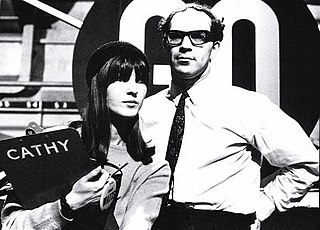
Ready Steady Go! was a British rock/pop music television programme broadcast every Friday evening from 9 August 1963 until 23 December 1966. It was conceived by Elkan Allan, head of Rediffusion TV. Allan wanted a light entertainment programme different from the low-brow style of light entertainment transmitted by ATV. The programme was produced without scenery or costumes and with a minimum of choreography and make-up. Allan recruited a fellow journalist, Francis Hitching, as producer. Hitching became a major figure in light entertainment in the 1960s. Robert Fleming was the first director, followed by the documentary director Rollo Gamble, then Michael Lindsay-Hogg, Daphne Shadwell and Peter Croft.

Dave Marsh is an American music critic and radio talk show host. He was an early editor of Creem magazine, has written for various publications such as Newsday, The Village Voice, and Rolling Stone, and has published numerous books about music and musicians, mostly focused on rock music. He is also a committee member of the Rock and Roll Hall of Fame.
"Oh, What a Night" is a song first recorded by the doo-wop group the Dells and released in 1956, originally under the title "Oh What a Nite". It is said to have been inspired by a party, which had been held in the Dells' honor by some female friends of the group.

"Bo Diddley" is a song by American rock and roll pioneer Bo Diddley. It introduced the rhythm that became known as the Bo Diddley beat and topped the Billboard R&B chart for two weeks in 1955. The song is included on many of Diddley's compilation albums including Bo Diddley (1958) and His Best (1997). Buddy Holly recorded a version that posthumously became his 2nd highest-charting single in the UK after "It Doesn't Matter Anymore".
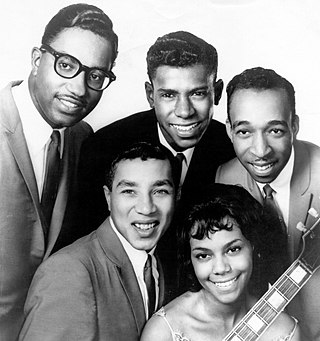
This article includes an overview of the events and trends in popular music in the 1960s.
Music of the United Kingdom developed in the 1960s into one of the leading forms of popular music in the modern world. By the early 1960s the British had developed a viable national music industry and began to produce adapted forms of American music in Beat music and British blues which would be re-exported to America by bands such as the Beatles, the Animals and the Rolling Stones. This helped to make the dominant forms of popular music something of a shared Anglo-American creation, and led to the growing distinction between pop and rock music, which began to develop into diverse and creative subgenres that would characterise the form throughout the rest of the twentieth century.
{{cite book}}: |first2= has generic name (help)